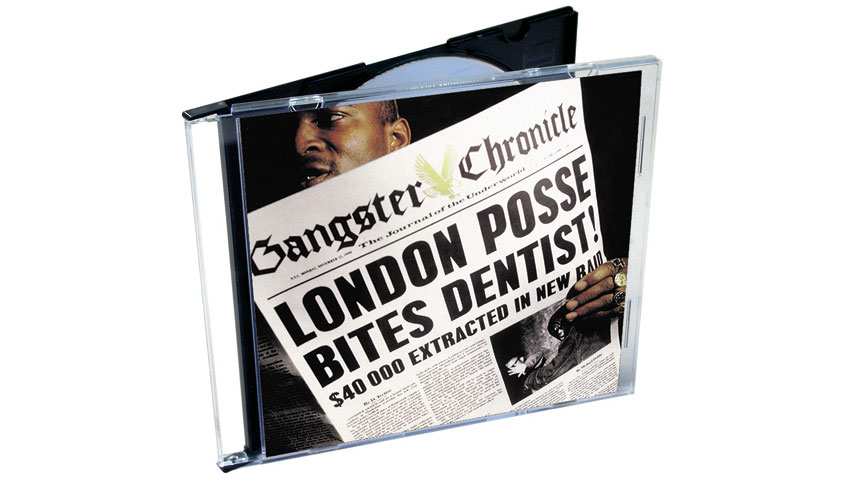Classic album: London Posse on Gangster Chronicle
Rodney P and Sparkii Ski look back over their seminal 1990 long player

Want all the hottest music and gear news, reviews, deals, features and more, direct to your inbox? Sign up here.
You are now subscribed
Your newsletter sign-up was successful
This is ground zero when it comes to UK hip-hop. It was the blueprint that showed British MCs that their own voice, both lyrically and musically, was as valid as any of their American counterparts.
Rodney P and Bionic shook off the norm of spitting in fake Yankee accents, and flipped Cockney chat and Jamaican patois into a new style of original London slang. It was like they’d hit the reset button, and hip-hop in this country would never be the same again.
“The album was a turning point in the sound of the music,” says Rodney P. “Most people thought it would sound shit in English - that was the common thought. We didn’t sound corny when we talked to each other day to day, so why should it sound corny if we string up the bars nice? In fact, what was corny was us rapping in American accents. That was really fucking corny [laughs].”
Matching homegrown beats to the bars was producer Sparkii Ski, an often-overlooked factor in the album’s seismic impact. His contributions behind the board, along with legendary engineer ‘No Sleep’ Nigel helped define a new era of UK hip-hop.
His chops on the sampler rivaled any of the toughest beats from across The Pond, and he was responsible for helping develop London Posse’s trailblazing fusion of rap and reggae in the bulk of the album’s tracks.
“We were second generation UK hip-hop,” says Sparkii. “And we long had our own identity as artists, leaning on the roots of reggae sound systems which we used to first perform under, so we were moulding it in that way. People look at the reggae influence in hip-hop as just being the music and the MC, but no. It’s about sound system culture and hi-fidelity. They always banged out their mixes. It was dynamic. That’s something that had to be brought to the table.”
Hip-hop has always been about using what you got to get what you want, and this crew knew that through and through. “In the early days, we were all about emulating the Americans," says Rodney. “We helped find our feet. That’s what we represented.”
Want all the hottest music and gear news, reviews, deals, features and more, direct to your inbox? Sign up here.
Here, Rodney and Sparkii take us through Gangster Chronicle track by track.

Money Mad
Rodney P: “On the way to the studio we went to Dub Vendor in Clapham Junction and bought 45s that make up a lot of the elements.
“Then we went to see Tim Westwood and a guy who worked for Jive Records called ‘Chuck’ New. He was the engineer for all those early Kool Moe Dee and Jazzy Jeff records. He’s the one that put all the pieces together and made this instrumental, using the jigsaw we gave him. I give him the credit for that. It’s still one of my favourite UK hip-hop riddims.
“The original came out on Westwood’s Justice label.”
Livin’ Pancoot
Rodney P: “It’s a very London tune. It’s a very London slang. Livin’ pancoot means a not very pretty girl. It was just us being young and stupid and chatting about girls in a real disrespectful way.”
Sparkii Ski: “I wasn’t a fan of timestretching - I felt you lost the character in the samples. I’ve always chopped samples and put things back together to sound like they weren’t chopped. That was the style then. In tracks like Livin’ Pancoot, you can hear how the Headhunters’ break has been chopped.
“Then there was a Soul Children loop [Move Over], which we used before anybody. UK hip-hop broke a lot of the loops early. The hook is Funk Inc [Sister Janie]. It’s an eclectic mix. The dubbed-out FX are from the [Akai] S950, using the loop feature and alternating loops with long releases. The bassline was a Roland 202, layered with an S950 test tone.”
Original London style
Sparkii Ski: “We spent around four hours on this hook. And in the ten-hour sessions we were doing, that’s quite a lot. It turned out to be one of the biggest challenges. The slow tempo was difficult. We used a Special Ed hook ['My style is broken into a slang'], which Bionic suggested. It was way, way faster. That did have to be timestretched through the Yamaha.
“There were three different loops running underneath. The kick and snare are from Stezo - It’s My Turn. It was a Skull Snaps break, but I sampled it from him as it had a nice compression. The Marvin Gaye sample [I Want You] was in there, but it was out of key. Nigel managed to pitchshift it, though.
“We did all the timestretching in the Akai S1000, then we shifted the pitch back up using the Yamaha SPX990. We were never happy with the sound of timestretching alone.
“Eustace Williams played a five-string bass here, which is how we got the low frequency. I just said, ‘Go deep, bruv’. That was based on Four Play by Maceo and the Horny Horns.”
Remedy For The Black Ash Blues
Rodney P: “If you don’t know, the actual remedy for the black ash blues is good weed. It was one of them things that when we were young and broke, we’d smoke black ash ‘cos it was cheap. Some of it is cool, but generally you’re broke when you smoke black ash, so you must have the blues ’cos you got no weed.
“That piece of instrumental just felt like a cool little piece of smoking music. I don’t know how many people that actually heard it worked that out, but that’s what it was.”
Jump Around
Rodney P: “The original version of this was produced by DJ Devastate and Brain B from Twilight Firm. That was crew. Devastate is still my bredrin. I was a big fan of his crew, Demon Boyz.
“It was a straight piece of party hip-hop. We really got to rap on that, at a tempo. We were MCs, so we really wanted to show we could rap. Really rap. Not just this pseudo-raggamuffin hip-hop ting.
“Man comes out of this hip-hop culture, for really real. Yeah, this was the funky club party tune. The remix, with Nomad Soul, was one of our biggest tunes in the club, too.”
Sexy Gal
Rodney P: “This features Culture Mark, one of our bredrins from Brixton. He used to chat on sound systems. This was a very hip-hop/reggae tune. Culture Mark brings a dancehall element. Almost a Professor Nuts vibe, as in the storytelling, you know?
“I really like the riddim. It was a fun tune. A lot of what we did was get the riddim tracks first, then it was a case of where the music took you. Looking back, I think, ‘Fucking hell! What were we thinking?’ We were just living: young, black and in England.”
“Looking back, I think, ‘Fucking hell! What were we thinking?’ We were just living: young, black and in England.”
Gangster Chronicle
Sparkii Ski: “The label said they needed one more song, and we were booked in for that night! I took my drum machine and sampler, and Rodney turned up with a crate of vinyl from Island Records, who ran Mango.
“There was this Courtney Pine loop [taken from Sacrifice], but the tempo was out. I linked it up and made a couple of beats. Then Bionic said, ‘Sparkii, you’re always on the two and the four, mate! Let me show you how it’s done.’
“He’s jumped up, run in the sound booth, and got on the kit and started playing like a punk rocker! I’d never seen him play drums in my life. I went home and worked on it all night, programming sound effects, strings, percussion layers, and then we came in the next day to finish it.”
Live Like The Other Half Do
Rodney P: “We recorded this on a trading estate in Acton. [Studio One legend] Coxsone Dodd came by the studio sessions when we were there. We were using an old Studio One riddim [Gonna Fight by The Heptones]. He just came in to see how we were dealing with it and to give us his blessings. Again, Sparkii produced that.”
Sparkii Ski: “It was my first time working with an authentic reggae sample, without twisting it up. It was challenging to get the groove to match the swing of the Steely & Clevie drum sounds.
“This was one of the early demos for Island Records. I was just jamming on the Korg M1 as a demo guide until a real pianist came in, but to my horror it was left in. I religiously avoided using that as it was always in early house, and I just really hated it for hip-hop.
“The line ‘Instead of sitting at home and screw’ means ‘screw face’. It’s about being grumpy, not having sex, as most people think.”

Oversized Idiot
Rodney P: “We helped produce this. The chorus is very reggae, but you’d have to be aware of what was happening in dancehall at the time [eg, Gregory Peck’s Oversize Mampie].
“There was a lot of tunes that had that in there: ‘Oversize, oversize, oversize…’ We just took it straight off. Being an oversized idiot means you’re a big, big idiot. And oversized mampie is a really, really fat girl.
“It was one of the earliest tunes we did as producers ourselves, not just accepting a beat off Sparkii. I think we did halfway alright [laughs].”
Sparkii Ski: “I came in with the beat, which was an Al Green break, chopped up with Joe Tex. And the bassline is Landslide by The Mohawks, which we’d always used for shows, and then I played in all the little keys and horns myself.”
Tell Me Something
Rodney P: “We helped to produce that one as well! I think it was because we were in the studio with some dead time, so we managed to come up with something.
“The chorus [sings] ‘I was born and raised in the ghetto’ - again another classic chorus. It was a Marlena Shaw one, but it was also in a lot of reggae records at the time. Whatever was a big R&B or soul tune would always have reggae versions of it. And that goes right up to the 80s and early 90s. People like Sanchez and Thriller U made careers from doing that. So, singing back stuff was normal to us. We totally flipped the riddim, with those dancehall and reggae elements.
“Tyrone Henry was on vocals. I went to primary school with him. He’d always been a really good singer. Now he’s touring all over the world as part of the live Michael Jackson show.”
Money Mad Bonus Beats
Rodney P: “We just loved beat. It was a case of ‘This ting is so good, let’s get it on its own at the end’. We knew the people would appreciate a little piece more of it. And the DJs did appreciate it.”
Sparkii Ski: “I did a remix of this, too. The challenge was taking it in the direction that it should have gone, originally. It scared me to go in and touch an underground classic. I wanted to make it heavy and bright, as I felt the original wasn’t. The beat was based on The 45 King’s production on Latee’s This Cut’s Got Flavor.”


Future Music is the number one magazine for today's producers. Packed with technique and technology we'll help you make great new music. All-access artist interviews, in-depth gear reviews, essential production tutorials and much more. Every marvellous monthly edition features reliable reviews of the latest and greatest hardware and software technology and techniques, unparalleled advice, in-depth interviews, sensational free samples and so much more to improve the experience and outcome of your music-making.
